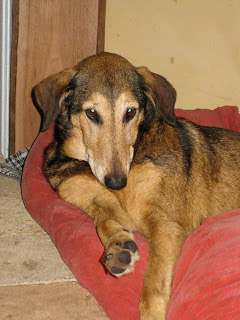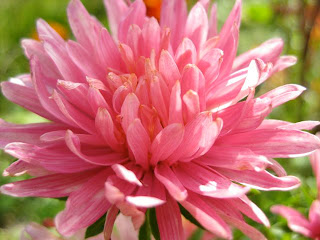28 June, 2008
Bated Breath
This week i'm waiting with bated breath (not baited traps mind you) to see if last weeks anti-wallaby methods are effective. If so, this might finally be the end of the wallaby saga and the beginning of a Wallaby Factsheet!
19 June, 2008
Wallabies revisited again!
 Previous wallaby measures have met with limited success, and of course, just as I'm about to harvest some vegies, they get munched.
Previous wallaby measures have met with limited success, and of course, just as I'm about to harvest some vegies, they get munched.The latest round of defense includes, a possum live trap (just in case, it's not wallabies), Perra in the garden over night for the next week, blood and bone sprinkled around the perimeter as well as hair. All of which are meant to be a bit pongy for the wallabies.
It's been suggested that I grow mint outside the garden as they love that, but I'm a bit worried the mint might go feral! So I'll just be slashing away from the garden to promote fresh grass for them.
Left: fierce wallaby guard on duty.
14 June, 2008
Things to consider when buying food
 I came across an interesting article about things to consider when buying food which I've extracted from and added to for this week's blog:
I came across an interesting article about things to consider when buying food which I've extracted from and added to for this week's blog:Is it local?
According to studies, if all food was consumed within 20km of where it was produced, costs associated with congestion and transport would be cut by 90%. If it hasn't travelled, as far it hasn't created as much greenhouse gases and is more likely to be fresh and nutritious. And of course you are supporting local business.
Is it in-season?
Food that is in-season, does not need to be packaged and refrigerated to the same degree to be appealing and tasty. As many of you have noticed, fresh and in-season produce lasts longer and so you are throwing out a lot less. It also uses less resources to consume produce that is in-season.
Is it highly packaged?
Because today's packaging is tomorrow's landfill, buying produce without all the layers is good for future generations and reduces the need for ugly tips.
Is it highly processed?
Highly processed or refined foods tend to use more energy and water in their production. Fresh, tasty produce retains more of the nutrition and doesn't require as much processing to be delicious!
Is it organic?
Organic farming focuses on the health of the soil and uses natural production methods rather than relying on synthetic chemicals. The upshot is that organic farms tend to be gentle on our native wildlife and produce less greenhouse pollution.
Food labelled "Certified Australian Organic" also means it is free of genetically modified organisms, and farm animals have been treated according to the strictest welfare standards.
05 June, 2008
No-effort transplants
A visit to a friend's wonderful garden in Singleton resulted in another improvement in the no-effort farming method.
As you know, we let the vegetables go completely to seed, which results in very thick beds of seedlings the next cycle. We've been harvesting these small plants as greens for salad, and to make room for the remainder to grow to a large size.
However this visit made me realise that they could equally be an ample source of healthy seedlings for other beds.
So what we do now is, when a bed comes up thick with seedlings, we get a trowel and remove sections of them. These are teased apart and planted into bare spaces in other beds. This gives the seedlings more space to grow in the old beds and in the new beds. Best of all, it requires no work from us to create an abundant supply of happy and healthy seedlings.
Once again, the idea is to interfere less and let natural processes work to assist us.
Subscribe to:
Posts (Atom)